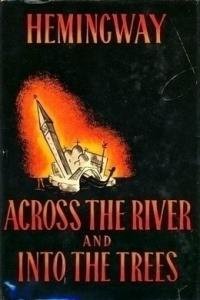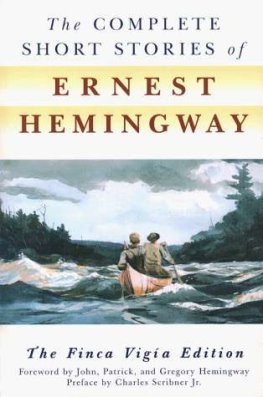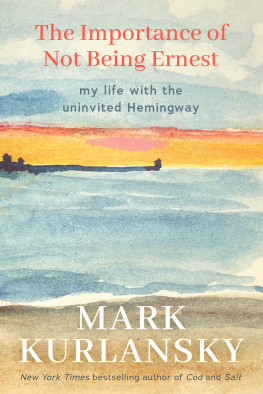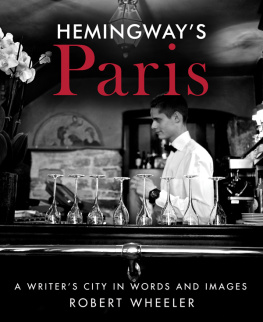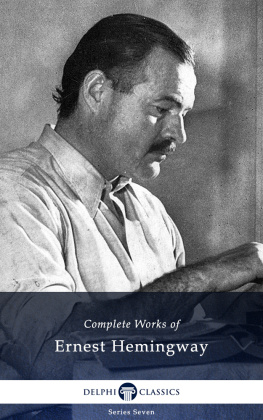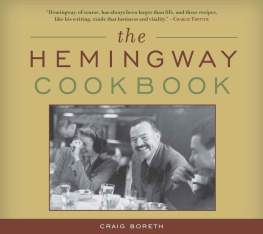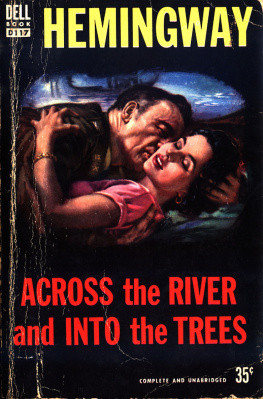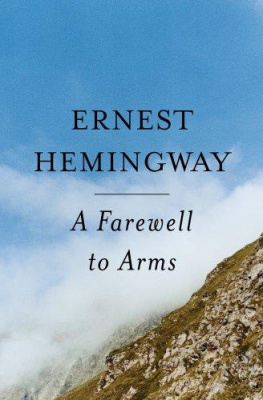Across the River and Into the Trees
Ernest Hemingway
They started two hours before daylight, and at first, it was not necessary to break the ice across the canal as other boats had gone on ahead. In each boat, in the darkness, so you could not see, but only hear him, the poler stood in the stern, with his long oar. The shooter sat on a shooting stool fastened to the top of a box that contained his lunch and shells, and the shooter's two, or more, guns were propped against the load of wooden decoys. Somewhere, in each boat, there was a sack with one or two live mallard hens, or a hen and a drake, and in each boat there was a dog who shifted and shivered uneasily at the sound of the wings of the ducks that passed overhead in the darkness.
Four of the boats went on up the main canal towards the big lagoon to the north. A fifth boat had already turned off into a side canal. Now, the sixth boat turned south into a shallow lagoon, and there was no broken water.
It was all ice, newfrozen during the sudden, windless cold of the night. It was rubbery and bending against the thrust of the boatman's oar. Then it would break as sharply as a pane of glass, but the boat made little forward progress.
'Give me an oar,' the shooter in the sixth boat said. He stood up and braced himself carefully. He could hear the ducks passing in the darkness, and feel the restless lurching of the dog. To the north he heard the sound of breaking ice from the other boats.
'Be careful,' the poler in the stern said. 'Don't tip the boat over.'
'I am a boatman, too,' the shooter said.
He took the long oar the boatman handed him and reversed it so he could hold it by the blade. Holding the blade he reached forward and punched the handle through the ice. He felt the firm bottom of the shallow lagoon, put his weight on the top of the wide oarblade, and holding with both hands and, first pulling, then shoving, until the polehold was well to the stern, he drove the boat ahead to break the ice. The ice broke like sheets of plate glass as the boat drove into it, and onto it, and astern the boatman shoved them ahead into the broken passage.
After a while, the shooter, who was working hard and steadily and sweating in his heavy clothes, asked the boatman, 'Where is the shooting barrel?'
'Off there to the left. In the middle of the next bay.'
'Should I turn for it now?'
'As you wish.'
'What do you mean, as I wish? You know the water. Is there water to carry us there?'
'The tide is low. Who knows?'
'It will be daylight before we get there if we don't hurry.'
The boatman did not answer.
All right, you surly jerk, the shooter thought to himself. We are going to get there. We've made twothirds of the way now and if you are worried about having to work to break ice to pick up birds, that is altogether too bad.
'Get your back in it, jerk,' he said in English.
'What?' the boatman asked in Italian.
'I said let's go. It's going to be light.'
It was daylight before they reached the oakenstaved hogshead sunk in the bottom of the lagoon. It was surrounded by a sloping rim of earth that had been planted with sedge and grass, and the shooter swung carefully up onto this, feeling the frozen grasses break as he stepped on them. The boatman lifted the combination shooting stool and shell box out of the boat and handed it to the shooter, who leaned over and placed it in the bottom of the big barrel.
The shooter, wearing his hip boots and an old combat jacket, with a patch on the left shoulder that no one understood, and with the slight light places on the straps, where stars had been removed, climbed down into the barrel and the boatman handed him his two guns.
He placed them against the wall of the barrel and hung his other shell bag between them, hanging it on two hooks built into the wall of the sunken barrel. Then he leaned the guns against each side of the shell bag.
'Is there water?' he asked the boatman.
'No water,' the boatman said.
'Can you drink the lagoon water?'
'No. It is unhealthy.'
The shooter was thirsty from the hard work of breaking the ice and driving the boat in and he felt his anger rise, and then held it, and said, 'Can I help you in the boat to break ice to put out the decoys?'
'No,' the boatman said and shoved the boat savagely out on to the thin sheet ice that cracked and ripped as the boat drove up on to it. The boatman commenced smashing at the ice with the blade of his oar and then started tossing decoys out to the side and behind him.
He's in a beautiful mood, the shooter thought. He's a big brute, too. I worked like a horse coming out here. He just pulled his weight and that's all. What the hell is eating him? This is his trade, isn't it?
He arranged the shooting stool so he would have the maximum swing to left and right, opened a box of shells, and filled his pockets and opened another of the boxes of shells in the shell bag so he could reach into it easily. In front of him, where the lagoon lay glazed in the first light, was the black boat and the tall, heavily built boatman smashing with his oar at the ice and tossing decoys overboard as though he were ridding himself of something obscene.
It was getting lighter now and the shooter could see the low line of the near point across the lagoon. Beyond that point he knew there were two other shooting posts and far beyond it there was more marsh and then the open sea. He loaded both his guns and checked the position of the boat that was putting out decoys.
From behind him, he heard the incoming whisper of wings and he crouched, took hold of his righthand gun with his right hand as he looked up from under the rim of the barrel, then stood to shoot at the two ducks that were dropping down, their wings set to brake, coming down dark to the grey dim sky, slanting towards the decoys.
His head low, he swung the gun on a long slant, down, well and ahead of the second duck, then without looking at the result of his shot he raised the gun smoothly, up, up ahead and to the left of the other duck that was climbing to the left and as he pulled, saw it fold in flight and drop among the decoys in the broken ice. He looked to his right and saw the first duck a black patch on the same ice. He knew he had shot carefully on the first duck, far to the right of where the boat was and on the second, high out and to the left, letting the duck climb far up and to the left to be sure the boat was out of any line of fire. It was a lovely double, shot exactly as he should have shot, with complete consideration and respect for the position of the boat and he felt very good as he reloaded.
'Listen,' the man in the boat called. 'Don't shoot towards the boat.'
I'll be a sad son of a bitch, the shooter said to himself. I will indeed.
'Get your decoys out,' he called to the man in the boat. 'But get them out fast. I won't shoot until they are all out. Except straight overhead.'
The man in the boat said nothing that could be heard.
I can't figure it, the shooter thought to himself. He knows the game. He knows I split the work, or more, coming out. I never shot a safer or more careful duck in my life than that. What's the matter with him? I offered to put the dekes out with him. The hell with him.
Out on the right now, the boatman was still chopping angrily at the ice and tossing out the wooden decoys in a hatred that showed in every move he made.
Don't let him spoil it, the shooter told himself. There won't be much shooting with this ice unless the sun should melt it later on, You probably will only have a few birds, so don't let him spoil it for you. You don't know how many more times you will shoot ducks and do not let anything spoil it for you.
He watched the sky lightening beyond the long point of marsh and turning in the sunken barrel, he looked out across the frozen lagoon and the marsh and saw the snowcovered mountains a long way off. Low as he was, no foothills showed and the mountains rose abruptly from the plain. As he looked towards the mountains he could feel a breeze on his face and he knew, then, the wind would come from there, rising with the sun and that some birds would surely come flying in from the sea when the wind disturbed them.

